Faith

After 36 years of serving churches as a pastor and consultant, I came to a startling conclusion the other day.
Not startling to you, perhaps. I might be the last person to get the memo. But the conclusion drew me up short.
My conclusion: Religion shouldn’t be this hard.
These magazine articles and blog posts published by Sojourners through the years pay tribute to the great South African leader.
Cynthia Bourgeault explains how we can both seek social justice and do justice to our souls.

IT WAS LIKE the end of the movie Lincoln. In an instant, one whole side of the House of Representatives turned, looked up at the five core fasters from the Fast for Families and erupted in overwhelmingly spirited applause. The applause reverberated throughout the chamber for what seemed like an eternity, though it was really only minutes. Ah, but what grand minutes. I wept. My body, standing there in the gallery, could not contain it.
The Fast for Families: A Call for Immigration Reform and Citizenship was launched on Nov. 12 with core fasters abstaining from all food and drinking only water. Based in a tent on the National Mall, only a few hundred yards from the Capitol building, the fast was sponsored by nearly 40 church and labor organizations and garnered support from more than 4,000 solidarity fasters across the U.S. and around the world. Our goal: To move the hearts and compassion of members of Congress to pass immigration reform with a path to citizenship.
In the Capitol building on Dec. 2, during the hour before the startling ovation, Eliseo Medina (the leader of the fast, which had reached the end of its 21st day on that Monday evening), D.J. Yoon (executive director of NAKASEC, a Korean-American advocacy agency), Cristian Avila (from Mi Familia Vota), and I received House member after member who’d come to visit us in the gallery to say “thank you for your sacrifice.” All the faces and names you usually see flashed across the screen commenting on the events of the day on cable television shows—they came to us, standing in the flesh, shaking our hands, grateful and concerned for our health.
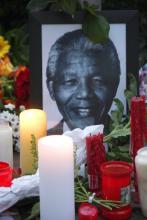
NELSON MANDELA was the most important political leader of the 20th century. While Roosevelt and Churchill helped protect the West and the world from Hitler’s Nazism, Mandela heroically exemplified the movement against the colonialism and racism that oppressed the global South, shown so dramatically in South Africa’s apartheid. And from a Christian point of view, he combined justice and reconciliation like no other political leader of his time, shaped by the spiritual formation of 27 years in prison.
Shortly after Mandela was released from prison, he came to New York to meet with a small group of Americans who had been involved in the anti-apartheid struggle, and I was blessed to join them. From the start, I felt in Mandela a moral authority I have never experienced with any political leader.
Attending Mandela’s inauguration in 1994 was a highlight of my life. We were picked up at the airport by friends, a couple who had both been in prison and tortured, but now she was about to become a member of the new South African parliament. We saw a group of the infamous South African security police. Having been interrogated by these thugs before, I immediately said, “Let’s get out of here!” To which they replied, “Don’t worry, Jim, they’re ours now.”
At the ceremony, joined by my South African friends, we watched Nelson Mandela announce his vision for a new rainbow nation. More than 100,000 people (and a billion or so more via TV) listened with tears in their eyes and great hope in their hearts.




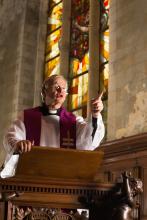
Sentiments of frustration are growing among many followers of Jesus who admire Christ but despise certain things associated with him.
They look at the New Testament and are attracted to Jesus’s selfless acts of generosity, service, and love, but don’t see the same spirit in today’s “Christian” institutions, churches, communities, and faith leaders.
Modern faith is often a complex minefield of theologies, doctrines, practices, and expectations, where individuals carefully walk on eggshells to avoid a litany of “sins” and “heresies” that will inevitably attract the wrath from religious friends, strangers, and authorities.

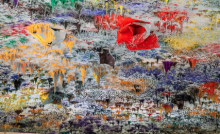
LONDON — Eight of the 47 countries that hold seats on the United Nations Human Rights Council imprisoned people in 2013 under laws that restrict religious freedom, according to a new report from Human Rights Without Frontiers International, a nonprofit advocacy organization based in Belgium.
The eight UNHRC member states on the group’s second annual World Freedom of Religion or Belief Prisoners List, released Monday, are Morocco, China, and Saudi Arabia (whose new three-year terms begin Wednesday), and current members India, Indonesia, Kazakhstan, Libya, and South Korea.
Hundreds of believers and atheists were imprisoned in these and 16 other countries for exercising religious freedom or freedom of expression rights related to religious issues, according to the report. These rights include the freedom to change religions, share beliefs, object to military service on conscientious grounds, worship, assemble, and associate freely. Violations related to religious defamation and blasphemy are also included in the report.

O gracious God, we thank you for getting us through 2013 — cantankerous, contentious bickering mess that it was on many public and political fronts — and we pray that you will help us to look back on it as the low-water mark from which American society emerged more civil and united.
For us to see an answer to that prayer, we must resolve to begin 2014 by climbing into stronger, healthier relationships with other people — not waiting stubbornly for them to come around to our way of thinking but deliberately moving to a position from which we love them more, understand them better, and honor our God in a new way.
Move far enough in this way, and we will turn our fractious society upside down.

The year 2013 ushered in a number of data milestones in American public opinion. Here is a sampling reported by the Pew Research Center.
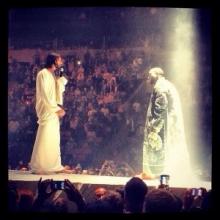
It’s the end of the year and, as always, a great time to reflect on what has happened over the past 12 months. I’ve been blessed to have so many talented and diverse writers share their voices and views alongside me on the God’s Politics blog. I want to take this opportunity to share some of my favorite posts from this past year with you, in no particular order.
Faith
We had so many great posts this year that explored the different facets of our faith. If you haven’t read them yet, make sure you look at:
What Good is a Ph.D. for reading the Bible? by Rev. Dr. Guy Nave
Five Things That Are Holding Christianity Back by Christian Piatt
10 reasons Why Men Should Not Be Ordained For Ministry by Eugene Cho
Women and Girls
Since the 1970s, Sojourners has been committed to resisting sexism in all its forms, while affirming the integrity and equality of women and men in the church and in the larger world. This year we’ve been even more intentional about looking at these topics through our blog and magazine.

As you make your winter reading list or shop for gifts, consider these 2013 books from Sojourners magazine staff and contributors. Or, buy yourself a gift for 2014.

As we prepare for the coming of Christ, the third Sunday of advent is celebrated in joy. As followers of Christ, it is reasonable to be exuberant about the birth of our Savior. The amount of happiness that can seep from the soul in response to a virgin birth, a perfect baby boy, and an adorable scene of livestock and shepherds befriending God’s family is immeasurable. Christmas music, Christmas decorations, and yes, even Christmas presents add to the joy and never fail to put a smile on my face.
This past weekend, as I tried to reflect on what it means to be joyful in Christ, my heart was temporarily hardened as I attended a Reentry Arts & Information Fair for returning citizens. I helped host a table for Becoming Church and their Why We Can’t Wait initiative.

Bio: Sister Jean Lait, CSF, is an Anglican Franciscan sister based in San Francisco who protests drones and their effects on children. communitystfrancis.org
1. Why did you decide to stand up against drones?
During WWII, I experienced the bombing of Coventry in England. As a child of 9 years, I slept under the stairs, anxiously waiting for the bombs to drop. Toward the end of the war, flying bombs known as “doodlebugs” were used. These were very similar to drones and were sent from Germany. They were aimed anywhere. These were bombs where you heard a whistle and then it was silent before the bang.
Thinking back on the fear and anxiety I experienced, the whole idea of drone warfare is just immoral to me. No child should ever be that frightened. No child should have to live in a war zone. That kind of trauma affects you, one way or another. You either use that experience for good or otherwise.
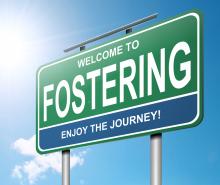
I WAS 7 years old when my family first opened our home to foster children. My parents were in their early 40s and already had four children at home. They were somewhat typical for foster parents at that time: married, established, often people of faith. We had a total of 10 children in our home—two of whom were adopted—from 1988 until 1997. Fostering children was a 24-hours-a-day, seven-days-a-week commitment and calling. As my mother would say, “God sets the lonely in families—but am I willing to let him set them in mine?”
This is a question that more Christians—particularly the oft-maligned Millennials—are asking themselves. They are examining both the sheer number of children growing up without families and scripture to see what it says about their faith. Taking their cue, and often their names, from James 1:27 (“look after orphans and widows in their distress”), groups in Colorado, Arizona, Oklahoma, Virginia, and most recently the District of Columbia have committed to looking after these modern-day “orphans in their distress.”
According to the Administration for Children and Families, in 2012 there were 400,000 children in foster care nationwide. Of that number, 102,000 were waiting to be adopted. Only 52,000 children were adopted in 2012; at the end of 2011, 15 percent of youth in the system lived in group homes or institutions. What is most troub-ling is the number of youth who “age out” of the system every year without the support of a family. At the end of 2011, 11 percent, or 26,000 youth in the system, aged out. These youth are much more likely to experience homelessness, health problems, unemployment, incarceration, and other trouble later in life.
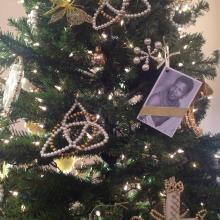
What makes one a good person? Additionally, what makes one a good Christian? I have been spending some time wondering about this as news of Mandela’s death has been making it’s way across the planet. Was he a good man? I think so, but how do we measure that? How do we know? And if, as some have claimed, his greatness stemmed from his willing embodiment of his Christian faith, I need to know if he was a good Christian.
Guy Sorman writes of Mandela:
“The Commission for Truth and Reconciliation, founded by President Mandela and led by Bishop Tutu, is perhaps the most concrete example of Mandela’s Christian faith. Instead of the vengeance and reprisals that were expected and feared after years of interracial violence, the commission focused on confession and forgiveness. Most of those who admitted misdeeds and even crimes — whether committed in the name of or in opposition to apartheid — received amnesty. Many returned to civil life, exonerated by their admission of guilt.”
Mandela is exemplary not because he was perfect, always kind to everyone he met, an ideal husband and father, but because of these larger virtues that he also attempted to live out. He lived into these virtues — all of them, large and small, and all of them incompletely.